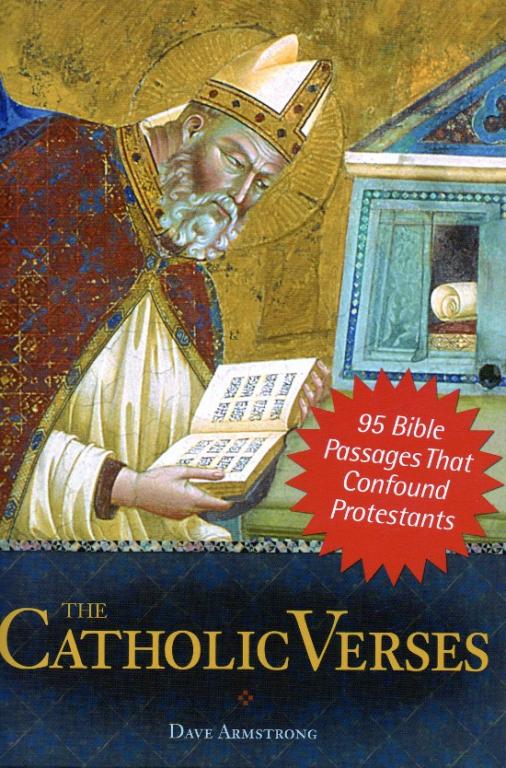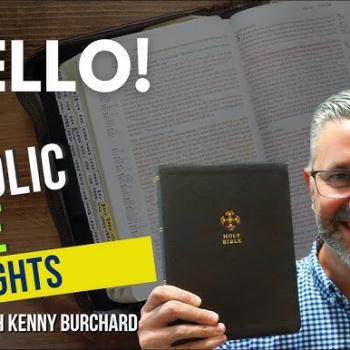
[review from October 2005 by Michael J. Miller]
Here is my introduction, written at the time on my blog, followed by the review:
Michael J. Miller was kind enough to review my first book, A Biblical Defense of Catholicism, in the May 2004 issue of this respected magazine. I just heard about that today (I always seem to be the last one to find out about these reviews — odd!). Now in the October 2005 issue, he has also favorably reviewed my latest published work, The Catholic Verses: 95 Bible Passages That Confound Protestants. The latter review is available online, as part of Ignatius Insight (HPR is published by Ignatius Press). Here is a little bit about HPR:
America’s Leading Pastoral Magazine
Founded over one hundred years ago, Homiletic & Pastoral Review is one of the most well-respected pastoral magazines in the world. Priests and laymen alike have relied on HPR for decades.
Edited by Fr. Kenneth Baker, S.J., author of the best selling, Fundamentals of Catholicism, and of the popular introduction to the Scripture, Inside the Bible. Editor for over thirty years, Father Baker’s experience is invaluable. His powerful monthly editorials will inform and inspire you. HPR features solid articles on every aspect of pastoral life and eloquent weekly sermons that illuminate through exposition of
scripture.Faithful to the teachings and tradition of the Church for over a century, our readers know what to expect in each issue.
. . . We don’t bend and sway with every passing fad. Built on the solid foundation of the Catholic Church, we espouse the timeless truths of Faith that never change.
. . . The Homiletic & Pastoral Review is unique among religious journals in the United States in that it was the very first clergy magazine to appear in the United States and has been the leading journal of its kind for over 100 years.
I am humbled and honored by hearing about both of these articles, and to be included in any fashion in such a reputable magazine. Actually, this is the first time I know of that my books have been reviewed anywhere in the orthodox Catholic paper media. Previously, I knew only of reviews in online venues, such as Catholic Exchange, or Amazon. Additionally, inclusion of these two books in the Catholic Answers catalogue (Defense / Verses) has been very helpful and appreciated, as is my entry (Defense) in the Coming Home Network catalogue.
It’s been a long time coming (remember, it took me seven years to get my first book published by a “real” publisher; it was finished in May 1996), so it is quite gratifying (and again, humbling) on a personal level, to receive this exposure. Thanks be to God that He has graciously allowed me this opportunity to share His message of the Gospel and the fullness of Christianity in the Holy Catholic Church with thousands of people, through the medium of writing. All glory to God.
***
Catholic Apologetics
THE CATHOLIC VERSES: 95 BIBLE PASSAGES THAT CONFOUND PROTESTANTS. By Dave Armstrong
Sophia Institute Press, 233 pp. PB $19.95.
Sixty or seventy years ago the casual stroller through Hyde Park in London might find a crowd gathered around a man standing on a soapbox and defending the Catholic faith. Frank Sheed, the greatest lay apologist of the twentieth century, put the Catholic Evidence Guild on the map through his efforts to carry on his work of “street preaching.”
Dave Armstrong, who was received into the Church in 1991 by the late Fr. John Hardon, S.J., is one of a new generation of pioneers who have taken Catholic apologetics into the electronic forum of Internet websites and chat rooms. His previous book, A Biblical Defense of Catholicism (2003) was favorably reviewed by this author in the May 2004 issue of HPR.
The subtitle of his new book alludes to the theses that Martin Luther nailed to the church doors in Wittenberg in 1517, thus beginning the Protestant Revolt. Armstrong’s purpose is to demonstrate that “Catholicism is at least as ‘biblically respectable’ as any brand of Protestantism.”
The author has honed and systematized his arguments, grouping them by topic into chapters entitled: “The Church,” “Divisions and Denominationalism,” “Bible and Tradition,” “The Papacy,” “Justification and Salvation,” etc., through the Sacraments and the Saints. He even ventures in the last two chapters to treat “Clerical Celibacy” and “Divorce,” which are quite controversial subjects even among Catholics nowadays.
Many of the arguments will be familiar to those who have read other works of Catholic apologetics or the conversion stories of former Protestants. Indeed, most Scriptural replies to Protestant challenges go back to classic works by St. Robert Bellarmine and St. Francis de Sales. Armstrong’s novel and important contribution is the almost textbook format, in which he consistently starts with one or more Scripture verses or passages and then goes on the offensive, challenging Protestant presuppositions. An example from Chapter 1 shows the effectiveness of this technique.
“The Church is the ‘Pillar of Truth.’ 1 Timothy 3:15: ‘…the household of God, which is the church of the living God, the pillar and bulwark of the truth.’
“Catholics accept this passage at face value: the Church is the ground or foundation of truth; it is infallible; it is specially protected by the Holy Spirit so that it can be the Guardian and Preserver of apostolic tradition and truth and doctrine. Protestants (in the final analysis) do not believe this, which is the reason they refer far more often to ‘scriptural authority’ than to ‘Church authority’ (as if the two were opposed to each other). Catholics, on the other hand, believe in faith that they will not and cannot be in conflict.
“This verse, then, would seem to run counter to the foundational assumption of Protestantism: sola Scriptura….”
Armstrong further undercuts Protestant positions by allowing Luther, Calvin and other non-Catholic Scripture commentators to join in the discussion. He cites passages from their works to show that the Protestant founders themselves did not reject the traditional Catholic interpretations of many key Scriptural verses, or else that their polemics misrepresented the Church’s actual teachings, especially about faith and works. Finally, occasional summaries of actual on-line debates give the reader a sense of how contemporary Bible-believing Protestants argue against Catholicism.
I recommend The Catholic Verses as a logical, lively, respectful and often compelling work of Catholic apologetics, which is less concerned about winning points than in letting the truth of Sacred Scripture shine in its fullness.
Michael J. Miller
Glenside, Pennsylvania
***












